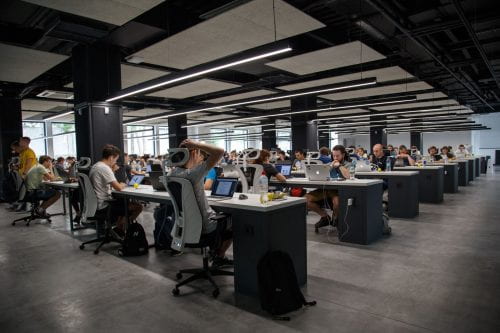Flexibility in where you work may be the new normal for office landlords to grasp. On Thursday, October 22, 2020, Cornell’s Baker Program in Real Estate welcomed Sara Baldi, Global Vice President of Realty Services for Raytheon Technologies, to its Distinguished Speaker Series in Real Estate.
Ms. Baldi, an executive in the world of corporate real estate, has spent the last twenty years helping companies build out their spaces. Previously, she served as Global Head of Real Estate and Facilities at Cruise LLC, where she managed to maintain essential operations during COVID. Before joining Cruise, Ms. Baldi led McKesson’s global portfolio strategy, as a VP of Global Workplace, and oversaw the portfolio restructuring and relocation of its headquarters to Irving, Texas. Today, she leads a team of 3,000 employees and manages over 100 million square feet globally.
As a part of her lecture, she shared her insights into corporate real estate and the trends she sees in the future. Drawing from her experiences, Ms. Baldi defined corporate real estate through the lens of a company’s lifecycle engagement: begins with portfolio strategy and real estate, moves to workplace strategy, transitions to project delivery, and lastly, operates through facilities management.
Starting with the land, Ms. Baldi describes portfolio strategy as a coalescence of location analysis, multi-year optimization strategies, and capital optimization strategies. She says companies’ corporate real estate teams often hold the best data and reasoning for their market locations, rather than human resources. Still, many companies underestimate the labor retention and attraction within the equation of location analysis. Another common mistake she sees is that companies do not manage their building turnover and lease expiration dates far enough in advance – if a decision to move is not made 18 months ahead of schedule, that project is in the red. Often, real estate is a company’s second largest budget expense and requires optimization. At McKesson, her team utilized eleven hub sites with long-term leaseholds, emphasizing how she selected markets that would match their labor profile.
Once a site location is settled, Ms. Baldi described how workplace strategy, a function of workplace standards, occupancy planning, and cultural anthropology, evolves. Workplace standards is about integrating space with technology to maximize employee utilization, often a cross-functional effort with HR. Equally important, occupancy planning allows companies to forecast headcounts and perform quarterly check-ins, determining what office services and supplies are needed. Lastly, cultural anthropology is a function of workplace experience and engagement – how effectively teams are using and socializing that space.

When it comes to creating the built environment, Ms. Baldi spoke about the importance of project delivery, assessing a company’s risk tolerance, and designing a build-out of their space. She contrasted design-bid-build for hospitals at Kaiser versus design-build for call centers at McKesson. For example, she highlighted an instance where commercial kitchens had been constructed on the top floor without the freight elevators to service them; consequently, the stench of food waste did not please many employees.
Finally, she discussed facilities management, tying the goals of workplace strategy and project delivery with safety and sustainability. She emphasized the importance of integrating design of technology and physical security, such as the touchless guard rails to enter, a necessity under COVID-19.
Additionally, Ms. Baldi gave her thoughts on two trends she sees in the workplace: the flexibility of work and co-working spaces. Within the pandemic, she states that many companies are realizing that working-from-home works and believes the virus has only been an accelerator in reducing office footprints. As a result, she sees huge blocks of sublease space on the market in San Francisco and North Dallas and does expect to see positive absorption for a very long time.
However, she does not foresee companies signing five-year co-working enterprise agreements over traditional five-year leases. While she believes that co-working has a purpose, the numbers and objectives do not pencil in her mind; why pay a premium for flexibility when you can build out your own space, protect your IP and networks, and control your own environment?
All in all, Ms. Baldi believes face-to-face and working sessions are important, but foresees what companies ask their employees to do in the office, post-COVID, may be forever different.


